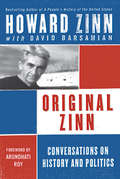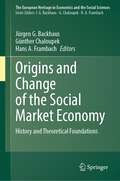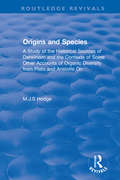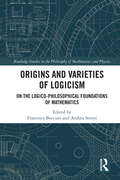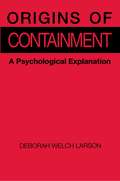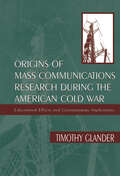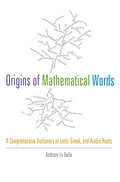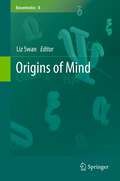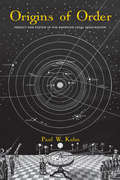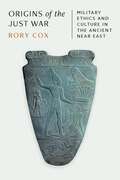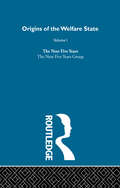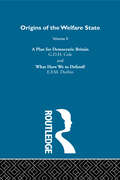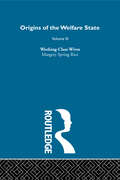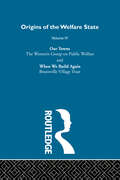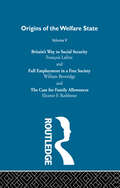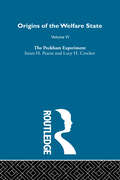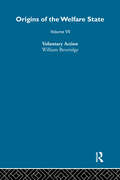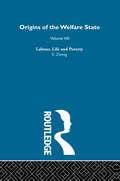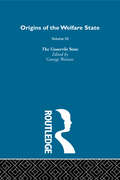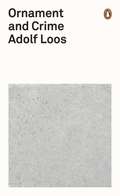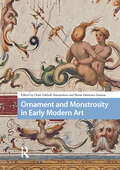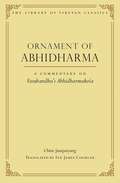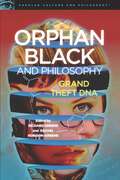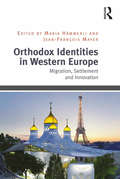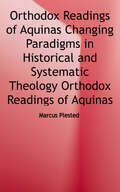- Table View
- List View
Original Zinn: Conversations on History and Politics
by Howard ZinnHistorian, activist, and bestselling author Howard Zinn has been interviewed by David Barsamian for public radio numerous times over the past decade. Original Zinn is a collection of their conversations, showcasing the acclaimed author of A People's History of the United States at his most engaging and provocative.Touching on such diverse topics as the American war machine, civil disobedience, the importance of memory and remembering history, and the role of artists--from Langston Hughes to Dalton Trumbo to Bob Dylan--in relation to social change, Original Zinn is Zinn at his irrepressible best, the acute perception of a scholar whose impressive knowledge and probing intellect make history immediate and relevant for us all.
Origins and Change of the Social Market Economy: History and Theoretical Foundations (The European Heritage in Economics and the Social Sciences #26)
by Günther Chaloupek Hans A. Frambach Jürgen G. BackhausThis edited volume addresses the theoretical and historical foundations of the German Social Market Economy. Written to commemorate the 75th anniversary of the establishment of the Social Market Economy, chapter contributions discuss the ideas of its theoretical founders—Walter Eucken, Alfred Müller-Armack, Wilhelm Röpke, and Franz Böhm--as well as related influences such as Ordoliberalism, the historical school of economics, and the Catholic social doctrine. In addition, chapters analyze differences and parallels to alternative policy concepts, in particular Keynesianism. Finally, the volume turns toward contemporary discussions of the Social Market Economy in the present political and economic context, specifically its ability to cope with current challenges. Providing rich context for the establishment of Germany’s contemporary economic system, this volume will be of interest to researchers and students of political, social and economic systems, the history of economic thought, and political history.
Origins and Species: A Study of the Historical Sources of Darwinism and the Contexts of Some Other Accounts of Organic Diversity from Plato and Aristotle On (Routledge Revivals #897)
by MJS HodgeOriginally published in 1991, Origins and Species seeks to understand the historical origins of Darwinism. The book analyses the explanatory problem of species variation to which Darwinian theory was a response, while contrasting the Darwinian with other traditions of the time, in the interpretation of organic diversity. The book looks in detail at both Charles Darwin’s theories and Alfred Russell Wallace’s theories of about plant and animal species and raises the question of the context of Darwinism and that of Plato’s and Aristotle’s understanding of species.
Origins and Varieties of Logicism: On the Logico-Philosophical Foundations of Mathematics (Routledge Studies in the Philosophy of Mathematics and Physics)
by Francesca Boccuni Andrea SereniThis book offers a plurality of perspectives on the historical origins of logicism and on contemporary developments of logicist insights in philosophy of mathematics. It uniquely provides up-to-date research and novel interpretations on a variety of intertwined themes and historical figures related to different versions of logicism.The essays, written by prominent scholars, are divided into three thematic sections. Part I focuses on major authors like Frege, Dedekind, and Russell, providing a historical and theoretical exploration of such figures in the philosophical and mathematical milieu in which logicist views were first expounded. Part II sheds new light on the interconnections between these founding figures and a number of influential other traditions, represented by authors like Hilbert, Husserl, and Peano, as well as on the reconsideration of logicism by Carnap and the logical empiricists. Finally, Part III assesses the legacy of such authors and of logicist themes for contemporary philosophy of mathematics, offering new perspectives on highly debated topics—neo-logicism and its extension to accounts of ordinal numbers and set-theory, the comparison between neo-Fregean and neo-Dedekindian varieties of logicism, and the relation between logicist foundational issues and empirical research on numerical cognition—which define the prospects of logicism in the years to come.This book offers a comprehensive account of the development of logicism and its contemporary relevance for the logico-philosophical foundations of mathematics. It will be of interest to graduate students and researchers working in philosophy of mathematics, philosophy of logic, and the history of analytic philosophy.
Origins of Containment: A Psychological Explanation
by Deborah Welch LarsonThe description for this book, Origins of Containment: A Psychological Explanation, will be forthcoming.
Origins of Mass Communications Research During the American Cold War: Educational Effects and Contemporary Implications (Sociocultural, Political, and Historical Studies in Education)
by Timothy GlanderIn this critical examination of the beginnings of mass communications research in the United States, written from the perspective of an educational historian, Timothy Glander uses archival materials that have not been widely studied to document, contextualize, and interpret the dominant expressions of this field during the time in which it became rooted in American academic life, and tries to give articulation to the larger historical forces that gave the field its fundamental purposes. By mid-century, mass communications researchers had become recognized as experts in describing the effects of the mass media on learning and other social behavior. However, the conditions that promoted and sustained their authority as experts have not been adequately explored. This study analyzes the ideological and historical forces giving rise to, and shaping, their research. Until this study, the history of communications research has been written almost entirely from within the field of communications studies and, as a result, has tended to refrain from asking troubling foundational questions about the origins of the field or to entertain how its emergence shaped educational discourse during the post-World War II period. By examining the intersection between the individual biographies of key leaders in the communications field (Wilbur Schramm, Paul Lazarsfeld, Bernard Berelson, Hadley Cantril, Stuart Dodd, and others) and the larger historical context in which they lived and worked, this book aims to tell part of the story of how the field of communications became divorced from the field of education. The book also examines the work of significant voices on the rise of mass communications study (including C. Wright Mills, William W. Biddle, Paul Goodman, and others) who theorized about the emergence of a mass society. It concludes with a discussion of the contemporary relevance of the theory of a mass society to educational thought and practice.
Origins of Mathematical Words: A Comprehensive Dictionary of Latin, Greek, and Arabic Roots
by Anthony Lo BelloThe most comprehensive math root dictionary ever published.Outstanding Academic Title, ChoiceDo you ever wonder about the origins of mathematical terms such as ergodic, biholomorphic, and strophoid? Here Anthony Lo Bello explains the roots of these and better-known words like asymmetric, gradient, and average. He provides Greek, Latin, and Arabic text in its original form to enhance each explanation. This sophisticated, one-of-a-kind reference for mathematicians and word lovers is based on decades of the author's painstaking research and work.Origins of Mathematical Words supplies definitions for words such as conchoid (a shell-shaped curve derived from the Greek noun for "mussel") and zenith (Arabic for "way overhead"), as well as approximation (from the Latin proximus, meaning "nearest"). These and hundreds of other terms wait to be discovered within the pages of this mathematical and etymological treasure chest.
Origins of Mind
by Liz SwanThe big question of how and why mindedness evolved necessitates collaborative, multidisciplinary investigation. Biosemiotics provides a new conceptual space that attracts a multitude of thinkers in the biological and cognitive sciences and the humanities who recognize continuity in the biosphere from the simplest to the most complex organisms, and who are united in the project of trying to account for even language and human consciousness in this comprehensive picture of life. The young interdiscipline of biosemiotics has so far by and large focused on codes, signs and sign processes in the microworld--a fact that reflects the field's strong representation in microbiology and embryology. What philosophers of mind and cognitive scientists can contribute to the growing interdiscipline are insights into how the biosemiotic weltanschauung applies to complex organisms like humans where such signs and sign processes constitute human society and culture.
Origins of Order: Project and System in the American Legal Imagination (Yale Law Library Series in Legal History and Reference)
by Paul W. KahnAn examination of how two fundamental concepts of order influence our ideas about sovereignty, citizenship, law, and history Western accounts of natural and political order have deployed two basic ideas: project and system. In a project, order is produced by the intentional act of a subject; in a system, order is immanent in the world. In the former, order is made; in the latter, discovered. Paul W. Kahn shows how project and system have long been at work in our theological and philosophical tradition. Against this background, Kahn explains the development of the modern legal imagination in the nineteenth century as a movement from project to system. Americans began the century imagining the constitutional order as their common project: a deliberate construction of We the People. They ended the century imagining that order is continuous with the common law: an immanent development of the principles of civilization. This imaginative shift affected ideas of legal text, sovereignty, citizenship, interpretation, history, and science.
Origins of the Just War: Military Ethics and Culture in the Ancient Near East
by Rory CoxA groundbreaking history of the ethics of war in the ancient Near EastOrigins of the Just War reveals the incredible richness and complexity of ethical thought about war in the three millennia preceding the Greco-Roman period, establishing the extent to which ancient just war thought prefigured much of what we now consider to be the building blocks of the Western just war tradition.In this incisive and elegantly written book, Rory Cox traces the earliest ideas concerning the complex relationship between war, ethics and justice. Excavating the ethical thought of three ancient Near Eastern cultures—Egyptian, Hittite and Israelite—he demonstrates that the history of the just war is considerably more ancient and geographically diffuse than previously assumed. Cox shows how the emergence of just war thought was grounded in a desire to rationalise, sacralise and ultimately to legitimise the violence of war. Rather than restraining or condemning warfare, the earliest ethical thought about war reflected an urge to justify state violence. Cox terms this presumption in favour of war ius pro bello—the “right for war”—characterizing it as a meeting point of both abstract and pragmatic concerns.Drawing on a diverse range of ancient sources, Origins of the Just War argues that the same imperative still underlies many of the assumptions of contemporary just war thought and highlights the risks of applying moral absolutism to the fraught ethical arena of war.
Origins of the Welfare State V1
by Nicholas DeakinFirst published in 2004. Consisting of both shorter pieces and reprints of entire books, this set restores to circulation a number of key texts from the debate about the future of welfare that took place in Britain following the depression. The collection covers the following areas: The period during which the country felt the full impact of the world depression. A number of solutions were put forward during this time to address the arising issues - in particular the consequences of mass unemployment. The approaches ranged from orthodox Marxism to modified conservatism and "middle opinion" A key feature of the debate was the concept of planning as a device to enable governments to cope with economic and social problems. * A range of different ideas were widely canvassed during the war years. It was considered that successful conduct of war could then be applied to the problems of peace. This set resurrects certain proposals, influential in the climate of the times, which have subsequently dropped out of circulation Early assessments dealing with the implications of Welfare State legislation are also included. Although the implementation of the welfare programme was in effect a bipartisan process it did not take long for doubts to be expressed - some of which were directed at the principles on which the Welfare State was being constructed. Volume 1 includes ‘The Next Five years’.
Origins of the Welfare State V2
by G.D.H. ColeFirst published in 2004. Consisting of both shorter pieces and reprints of entire books, this set restores to circulation a number of key texts from the debate about the future of welfare that took place in Britain following the depression. The collection covers the following areas: The period during which the country felt the full impact of the world depression. A number of solutions were put forward during this time to address the arising issues - in particular the consequences of mass unemployment. The approaches ranged from orthodox Marxism to modified conservatism and "middle opinion" A key feature of the debate was the concept of planning as a device to enable governments to cope with economic and social problems. * A range of different ideas were widely canvassed during the war years. It was considered that successful conduct of war could then be applied to the problems of peace. This set resurrects certain proposals, influential in the climate of the times, which have subsequently dropped out of circulation Early assessments dealing with the implications of Welfare State legislation are also included. Although the implementation of the welfare programme was in effect a bipartisan process it did not take long for doubts to be expressed - some of which were directed at the principles on which the Welfare State was being constructed. Volume 2 includes ‘Plan for Britain’ and ‘ What have we to defend?’.
Origins of the Welfare State V3
by Working-Class WivesFirst published in 2004. Consisting of both shorter pieces and reprints of entire books, this set restores to circulation a number of key texts from the debate about the future of welfare that took place in Britain following the depression. The collection covers the following areas: The period during which the country felt the full impact of the world depression. A number of solutions were put forward during this time to address the arising issues - in particular the consequences of mass unemployment. The approaches ranged from orthodox Marxism to modified conservatism and "middle opinion" A key feature of the debate was the concept of planning as a device to enable governments to cope with economic and social problems. * A range of different ideas were widely canvassed during the war years. It was considered that successful conduct of war could then be applied to the problems of peace. This set resurrects certain proposals, influential in the climate of the times, which have subsequently dropped out of circulation Early assessments dealing with the implications of Welfare State legislation are also included. Although the implementation of the welfare programme was in effect a bipartisan process it did not take long for doubts to be expressed - some of which were directed at the principles on which the Welfare State was being constructed. Volume 3 includes ‘Working Class Wives'.
Origins of the Welfare State V4
by The Women’s Group on Public Welfare and Bournville Village TrustFirst published in 2004. Consisting of both shorter pieces and reprints of entire books, this set restores to circulation a number of key texts from the debate about the future of welfare that took place in Britain following the depression. The collection covers the following areas: The period during which the country felt the full impact of the world depression. A number of solutions were put forward during this time to address the arising issues - in particular the consequences of mass unemployment. The approaches ranged from orthodox Marxism to modified conservatism and "middle opinion" A key feature of the debate was the concept of planning as a device to enable governments to cope with economic and social problems. * A range of different ideas were widely canvassed during the war years. It was considered that successful conduct of war could then be applied to the problems of peace. This set resurrects certain proposals, influential in the climate of the times, which have subsequently dropped out of circulation Early assessments dealing with the implications of Welfare State legislation are also included. Although the implementation of the welfare programme was in effect a bipartisan process it did not take long for doubts to be expressed - some of which were directed at the principles on which the Welfare State was being constructed. Volume 4 includes ‘Our towns / the Women's Group on Public Welfare’ and, ‘When we build again’.
Origins of the Welfare State V5
by François Lafitte, William Beveridge and Eleanor F. RathboneFirst published in 2004. Consisting of both shorter pieces and reprints of entire books, this set restores to circulation a number of key texts from the debate about the future of welfare that took place in Britain following the depression. The collection covers the following areas: The period during which the country felt the full impact of the world depression. A number of solutions were put forward during this time to address the arising issues - in particular the consequences of mass unemployment. The approaches ranged from orthodox Marxism to modified conservatism and "middle opinion" A key feature of the debate was the concept of planning as a device to enable governments to cope with economic and social problems. * A range of different ideas were widely canvassed during the war years. It was considered that successful conduct of war could then be applied to the problems of peace. This set resurrects certain proposals, influential in the climate of the times, which have subsequently dropped out of circulation Early assessments dealing with the implications of Welfare State legislation are also included. Although the implementation of the welfare programme was in effect a bipartisan process it did not take long for doubts to be expressed - some of which were directed at the principles on which the Welfare State was being constructed. Volume 5 includes Britain's way to social security; Full employment in a free society and The case for family allowances.
Origins of the Welfare State V6
by Innes H. PearseFirst published in 2004. Consisting of both shorter pieces and reprints of entire books, this set restores to circulation a number of key texts from the debate about the future of welfare that took place in Britain following the depression. The collection covers the following areas: The period during which the country felt the full impact of the world depression. A number of solutions were put forward during this time to address the arising issues - in particular the consequences of mass unemployment. The approaches ranged from orthodox Marxism to modified conservatism and "middle opinion" A key feature of the debate was the concept of planning as a device to enable governments to cope with economic and social problems. * A range of different ideas were widely canvassed during the war years. It was considered that successful conduct of war could then be applied to the problems of peace. This set resurrects certain proposals, influential in the climate of the times, which have subsequently dropped out of circulation Early assessments dealing with the implications of Welfare State legislation are also included. Although the implementation of the welfare programme was in effect a bipartisan process it did not take long for doubts to be expressed - some of which were directed at the principles on which the Welfare State was being constructed. Volume 6 includes The Peckham Experiment / Innes Pearse and Lucy Crocker.
Origins of the Welfare State V7
by William BeveridgeFirst published in 2004. Consisting of both shorter pieces and reprints of entire books, this set restores to circulation a number of key texts from the debate about the future of welfare that took place in Britain following the depression. The collection covers the following areas: The period during which the country felt the full impact of the world depression. A number of solutions were put forward during this time to address the arising issues - in particular the consequences of mass unemployment. The approaches ranged from orthodox Marxism to modified conservatism and "middle opinion" A key feature of the debate was the concept of planning as a device to enable governments to cope with economic and social problems. * A range of different ideas were widely canvassed during the war years. It was considered that successful conduct of war could then be applied to the problems of peace. This set resurrects certain proposals, influential in the climate of the times, which have subsequently dropped out of circulation Early assessments dealing with the implications of Welfare State legislation are also included. Although the implementation of the welfare programme was in effect a bipartisan process it did not take long for doubts to be expressed - some of which were directed at the principles on which the Welfare State was being constructed. Volume 7 includes Voluntary action by William Beveridge.
Origins of the Welfare State V8
by F. ZweigFirst published in 2004. Consisting of both shorter pieces and reprints of entire books, this set restores to circulation a number of key texts from the debate about the future of welfare that took place in Britain following the depression. The collection covers the following areas: The period during which the country felt the full impact of the world depression. A number of solutions were put forward during this time to address the arising issues - in particular the consequences of mass unemployment. The approaches ranged from orthodox Marxism to modified conservatism and "middle opinion" A key feature of the debate was the concept of planning as a device to enable governments to cope with economic and social problems. * A range of different ideas were widely canvassed during the war years. It was considered that successful conduct of war could then be applied to the problems of peace. This set resurrects certain proposals, influential in the climate of the times, which have subsequently dropped out of circulation Early assessments dealing with the implications of Welfare State legislation are also included. Although the implementation of the welfare programme was in effect a bipartisan process it did not take long for doubts to be expressed - some of which were directed at the principles on which the Welfare State was being constructed. Volume 8 includes Labour, life, and poverty by F. Zweig.
Origins of the Welfare State V9
by George WatsonFirst published in 2004. Consisting of both shorter pieces and reprints of entire books, this set restores to circulation a number of key texts from the debate about the future of welfare that took place in Britain following the depression. The collection covers the following areas: The period during which the country felt the full impact of the world depression. A number of solutions were put forward during this time to address the arising issues - in particular the consequences of mass unemployment. The approaches ranged from orthodox Marxism to modified conservatism and "middle opinion" A key feature of the debate was the concept of planning as a device to enable governments to cope with economic and social problems. * A range of different ideas were widely canvassed during the war years. It was considered that successful conduct of war could then be applied to the problems of peace. This set resurrects certain proposals, influential in the climate of the times, which have subsequently dropped out of circulation Early assessments dealing with the implications of Welfare State legislation are also included. Although the implementation of the welfare programme was in effect a bipartisan process it did not take long for doubts to be expressed - some of which were directed at the principles on which the Welfare State was being constructed. Volume 9 includes The Unservile state by George Watson et al.
Ornament and Crime
by Adolf LoosRevolutionary essays on design, aesthetics and materialism - from one of the great masters of modern architectureAdolf Loos, the great Viennese pioneer of modern architecture, was a hater of the fake, the fussy and the lavishly decorated, and a lover of stripped down, clean simplicity. He was also a writer of effervescent, caustic wit, as shown in this selection of essays on all aspects of design and aesthetics, from cities to glassware, furniture to footwear, architectural training to why 'the lack of ornament is a sign of intellectual power'.Translated by Shaun WhitesideWith an epilogue by Joseph Masheck
Ornament and Monstrosity in Early Modern Art (Visual and Material Culture, 1300-1700)
by Chris Askholt Hammeken Maria Fabricius HansenEarly modern art features a remarkable fascination with ornament, both as decorative device and compositional strategy, across artistic media and genres. Interestingly, the inventive, elegant manifestations of ornament in the art of the period often include layers of disquieting paradoxes, creating tensions - monstrosities even - that manifest themselves in a variety of ways. In some cases, dichotomies (between order and chaos, artificiality and nature, rational logic and imaginative creativity, etc.) may emerge. Elsewhere, a sense of agitation undermines structures of statuesque control or erupts into wild, unruly displays of constant genesis. The monstrosity of ornament is brought into play through strategies of hybridity and metamorphosis, or by the handling of scale, proportion, and space in ambiguous and discomforting ways that break with the laws of physical reality. An interest in strange exaggeration and curious artifice allows for such colossal ornamental attitude to thrive within early modern art.
Ornament of Abhidharma: A Commentary on Vasubandhu's Abhidharmako?a (Library of Tibetan Classics #23)
by Chim JampalyangThe single greatest Tibetan commentary—never previously translated—on one of the most well-known and cited works of classical Indian Buddhism.This work by a scholar of the Kadam school is the most authoritative Tibetan commentary on Vasubandhu’s Treasury of Abhidharma (Abhidharmakosa). In terms of stature and authority, Vasubandhu’s Treasury rivals Buddhaghosa’s contemporaneous Path of Purification and deals with such central themes as the dynamics of emotions and karma, of mental and meditative states; it treats both the cosmos and the life within. Chim Jampalyang’s exposition of it is the greatest flowering of Abhidharma studies in Tibet. Usually referred to as the Chimzö, it is to this day a key textbook in the great monastic universities. A veritable encyclopedia, it spans all areas of classical Indian Buddhist knowledge and is an indispensable reference for scholars of Buddhism. The Library of Tibetan Classics is a special series being developed by the Institute of Tibetan Classics to make key classical Tibetan texts part of the global literary and intellectual heritage. Eventually comprising thirty-two large volumes, the collection will contain over two hundred distinct texts by more than a hundred of the best-known Tibetan authors. These texts have been selected in consultation with the preeminent lineage holders of all the schools and other senior Tibetan scholars to represent the Tibetan literary tradition as a whole.
Orphan Black and Philosophy
by Richard Greene Rachel Robison-GreeneIn Orphan Black, several apparently unconnected women discover that they are exact physical doubles, that there are more of them out there, that they are all illegally produced clones, and that someone is having them killed. They find themselves in the midst of a secret and violent struggle between a fundamentalist religious group, a fanatical cult of superhuman biological enhancement, a clandestine department of the military, and a giant biotech corporation. Law enforcement is powerless and easily manipulated by these sinister forces. The clones are forced to form their own Clone Club, led by the resourceful Sarah Manning, to defend themselves against their numerous enemies and to find out exactly where they came from and why. <p><p> Orphan Black continually raises philosophical issues, as well as ethical and policy questions deserving philosophical analysis. What makes a person a unique individual? Why is it so important for us to know where we came from? Should we have a say in whether a clone is made of us? Is it immoral to generate clones with built-in health problems or personality defects - and if so, does that mean that producers of clones must practice eugenic selection? What light does the behavior of members of the Clone Club shed on the nature-nurture debate? Is it relevant that most are heterosexual, one is a lesbian, and one is a transgender male? <p> This TV show shows us problems of biotechnology which will soon be vital everyday issues. But what kind of a future faces us when human clones are commonplace? Will groups of human clones have a tight bond of solidarity making them a threat to democracy? If the world is going to be taken over by an evil conspiracy, would it better be a scientific cult like Neolution or a religious cult like the Prolethians? Should biotech corporations be able to own the copyright on human DNA sequences? What rules of morality apply when you can't trust the police and powerful groups are ready to murder you?
Orthodox Identities in Western Europe: Migration, Settlement and Innovation
by Jean-François Mayer Maria HämmerliThe Orthodox migration in the West matters, despite its unobtrusive presence. And it matters in a way that has not yet been explored in social and religious studies: in terms of size, geographical scope, theological input and social impact. This book explores the adjustment of Orthodox migrants and their churches to Western social and religious contexts in different scenarios. This variety is consistent with Orthodox internal diversity regarding ethnicity, migration circumstances, Church-State relations and in line with the specificities of the receiving country in terms of religious landscape, degree of secularisation, legal treatment of immigrant religious institutions or socio-economic configurations. Exploring how Orthodox identities develop when displaced from traditional ground where they are socially and culturally embedded, this book offers fresh insights into Orthodox identities in secular, religiously pluralistic social contexts.
Orthodox Readings of Aquinas (Changing Paradigms In Historical And Systematic Theology Ser.)
by Marcus PlestedThis book is the first exploration of the remarkable odyssey of Thomas Aquinas in the Orthodox Christian world, from the Byzantine to the modern era. Aquinas was received with astonishing enthusiasm across the Byzantine theological spectrum. By contrast, modern Orthodox readings of Aquinas have been resoundingly negative, routinely presenting Aquinas as the archetype of as a specifically Western form of theology against which the Orthodox East must set its face. Basing itself primarily on a close study of the Byzantine reception of Thomas, this study rejects such hackneyed dichotomies, arguing instead for a properly catholic or universal construal of Orthodoxy - one in which Thomas might once again find a place. In its probing of the East-West dichotomy, this book questions the widespread juxtaposition of Gregory Palamas and Thomas Aquinas as archetypes of opposing Greek and Latin theological traditions. The long period between the Fall of Constantinople and the Russian Revolution, conventionally written off as an era of sterility and malformation for Orthodox theology, is also viewed with a fresh perspective. Study of the reception of Thomas in this period reveals a theological sophistication and a generosity of vision that is rarely accounted for. In short, this is a book which radically re-thinks the history of Orthodox theology through the prism of the fascinating and largely untold story of Orthodox engagement with Aquinas.
